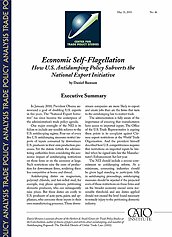In January 2010, President Obama announced a goal of doubling U.S. exports in five years. The “National Export Initiative” has since become the centerpiece of the administration’s trade policy agenda.
One major oversight of the NEI is its failure to include any sensible reforms to the U.S. antidumping regime. Four out of every five U.S. antidumping measures restrict imports of inputs consumed by downstream U.S. producers in their own production processes. Yet the statute forbids the administering authorities from considering the economic impact of antidumping restrictions on those firms or on the economy at large. Such restrictions raise the costs of production for downstream firms, rendering them less competitive at home and abroad.
Antidumping duties on magnesium, polyvinyl chloride, and hot-rolled steel, for example, may please upstream, petitioning domestic producers, who can subsequently raise prices. But those duties are costly to U.S. producers of auto parts, paint, and appliances, who consume those inputs in their own manufacturing processes. Those downstream companies are more likely to export and create jobs than are the firms that turn to the antidumping law to restrict trade.
The administration is fully aware of the importance of ensuring that manufacturers have access to imported inputs. The Office of the U.S. Trade Representative is arguing these points in its complaint against Chinese export restrictions at the World Trade Organization. And the president himself described how U.S. competitiveness requires that restrictions on imported inputs be limited when he signed into law the Manufacturer’s Enhancement Act last year.
The NEI should include a serious commitment to antidumping reform. At a minimum, consuming industries should be given legal standing to participate fully in antidumping proceedings, antidumping measures should be rejected if the projected costs of those restrictions on those firms and on the broader economy exceed some reasonable threshold, and any duties applied should not exceed the level found necessary to remedy injury to the petitioning domestic industry.

This work is licensed under a Creative Commons Attribution-NonCommercial-ShareAlike 4.0 International License.

